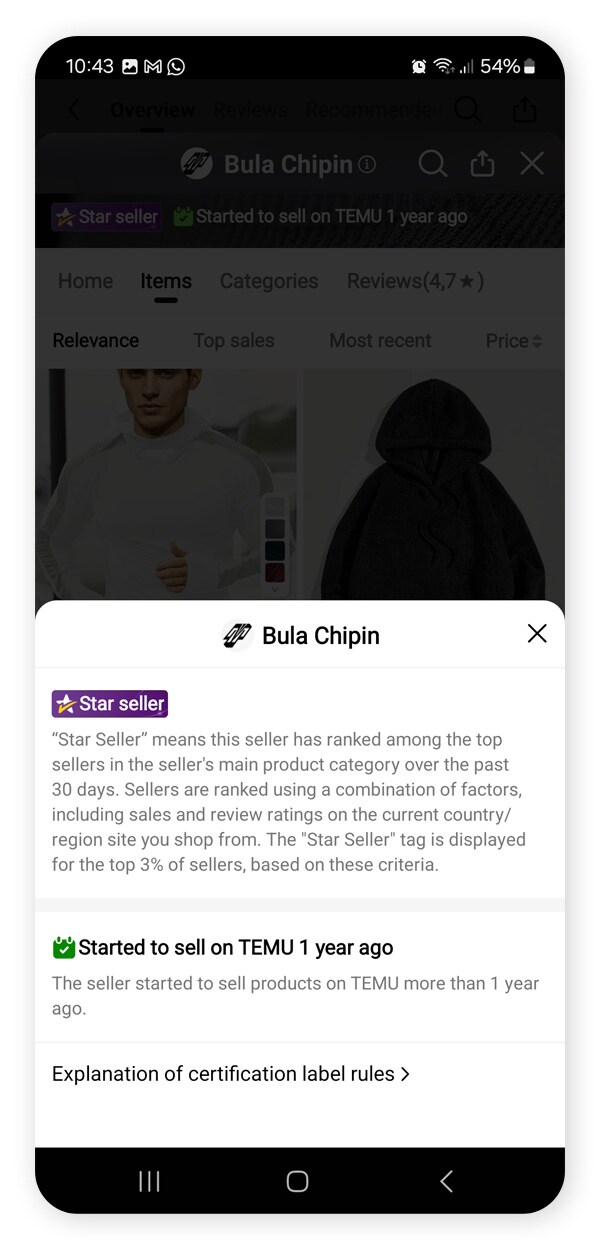Tip: Never give out your personal information to a third party. Avoid participating in social media promos, especially if they seem too good to be true.
Savvy shoppers looking for a good deal online know it’s important to be on the lookout for scammers who prey on unwitting shoppers, and Temu is no exception. Bogus gift cards, fake customer service representatives, and sellers flogging counterfeit goods are some common scams to look out for while using the platform.
Learn more about how to recognize these scams and how to keep your personal information safer when shopping online. Need answers fast? Get a summary in ChatGPT.
1. Fake promo codes scam
Fake Temu promo codes are a common e-commerce scam. Online ads or offers on social media sites like TikTok encourage victims to enter personal information in order to receive a promo code. The promised promo never materializes, and by giving personal information, and possibly even payment details to the scammer, you leave yourself wide open to fraud and identity theft.
Another common Temu scam seen on social media is perpetrated by scammers encouraging their followers to download the Temu app and use their promo code. This code doesn’t provide any benefit for the follower, but gives the scammer additional rewards and benefits on the Temu site.
2. Gift card scam
Gift card scams are another popular Temu scam. Unlike promo code scams, gift card scams often require victims to complete a survey or make a small purchase or payment in order to receive a gift card. Victims are lured in by the thought of the reward and unwittingly give the scammers access to their payment information and other personal details.
Tip: Beware of entering payment information on a third-party website. Stick to making verified purchases on the official Temu website.
3. Customer service impersonation scam
Like many tech support scams, receiving texts or calls from someone claiming to be a Temu customer service representative is a common scam. The customer service impersonator claims there’s a problem with the victim’s Temu order or account details and asks the customer to “verify” their personal information or payment details.
These fake phone calls are a common social engineering technique that don’t give the victim enough time to think, so they only realize after the fact that they were being scammed. AI scams that impersonate someone the victim knows are also increasingly common.
Tip: Never give out sensitive information in an unsolicited call or message from someone claiming to be a representative of a legitimate company. If in doubt, contact customer service through the official channels to verify the claim.
4. Fake Temu websites
Some scammers create fraudulent sites that closely mimic the real Temu platform, encouraging users who don’t notice the subtle differences to enter personal and financial information. Scammers then use the entered information to commit financial fraud or even identity theft. Victims are often directed to these fake sites via a link in a spoof email, text message, or an ad on a social media site.
These fake Temu websites often look nearly identical to the real deal, but telltale signs of a pharming website include spelling and grammar mistakes, using a different URL (such as temu-shop.com instead of temu.com), and an unsecured connection (HTTP instead of HTTPS in the browser’s address bar).
Tip: Double-check the URL and look for HTTPS with the padlock icon in the browser’s address bar to ensure the connection is secure and the website is legitimate before entering any personal information.
5. Counterfeit goods scam
Temu allows third-party sellers to sell on its platform, and among these sellers lurk scammers trying to offload counterfeit goods. One of the reasons why Temu is so affordable is because some goods sold there might be of lower quality than advertised or differ from the description and photos online.
In some cases, products have been tested and found to be dangerous. Investigative reporter Ellie Flynn uncovered cases of products containing harmful chemicals for sale on Temu, including jewelry and children’s clothing. In a different Temu fraud scam, a third-party seller was discovered to be selling counterfeit Air Jordans.
Tip: Look at reviews for third-party sellers on Temu before making a purchase, and don’t buy from a seller without a verification badge — although even this badge doesn’t guarantee that a product is everything the seller claims.
6. Affiliate link scam
Scammers often exploit affiliate links to deceive Temu users. They create a fake promotion or giveaway and offer discounts, rewards, or even cash prizes for users who click on the affiliate link. While the scammer reaps the benefits, the victims waste time and money chasing a too-good-to-be-true reward.
In more serious cases, Temu affiliate link scams involve phishing. These scams are designed to lure users to a fake website and trick victims into entering sensitive personal information such as login details, passwords, or even financial information.
Tip: Don’t enter your personal information on a website you reach after clicking an affiliate link. Instead, go to Temu directly and check that the reward or promotion offered is the real deal.
7. Order tracking scam
Order tracking scams are a common occurrence for big e-commerce sites such as Temu. The scammer sends a text message pretending to be from Temu with a link to track a recent Temu order — but this Temu text scam is just an opportunity for scammers to trick the victim into following the fake link and entering sensitive personal data to “verify your identity” or “confirm your order.”
Temu order tracking scams are particularly effective for Temu customers who might have one or more orders on the way and assume the text is authentic. In these cases, it can be hard to spot a fake text message.
Tip: Track your Temu orders via the official website rather than clicking links you receive via text or email — these are more likely to be scams.
8. Brushing scam
On the surface, the outcome of a Temu brushing scam may seem like a win (free stuff!), but this type of Temu fraud hides concerning data security risks for the person affected.
In this type of scam, the victim receives an unsolicited Temu package of goods they didn’t order. The seller then uses this scam to boost their sales, and uses the victim’s “purchase” to create fake reviews for their products. This boosts the seller’s profile on Temu, and while the victim doesn’t pay for the unsolicited goods, the fact that their Temu account and mailing address have been used without their consent is a big security concern.
This type of Temu fraud also makes it difficult for consumers to differentiate between scammers and reliable sellers, as brushing scams mean that glowing reviews for verified purchases could be fake.
Tip: Secure your Temu account and other online accounts with two-factor authentication (2FA). And, create strong, unique passwords to keep your data safer and help prevent security breaches.
9. Fake job scam
Sites like Temu are often hiring, so fake Temu job ads are an easy way for scammers to lure in unsuspecting victims. The scammer posts a fake job ad, often with an enticing salary or benefits like remote work or big bonuses to attract more applicants. This way, victims supply sensitive personal information upfront and can then be targeted for financial scams. This Reditter received an unsolicited Temu job offer and was encouraged to reach out via WhatsApp — a classic example of a fake job scam.
Tip: Apply for jobs directly on the Temu website rather than clicking on a third-party ad, and beware of a job offer that seems too good to be true.
Is Temu a scam?
The site’s suspiciously good deals can look suspicious, but Temu itself is not a scam. But while Temu is an authentic site, scammers exploit its popularity to run their scams. As with any online marketplace, there are risks involved in purchasing from Temu sellers, but that doesn’t make Temu as a platform more or less dangerous than other online shopping experiences.
As always, it’s important to be aware of common scams in order to shop safely online, whether from Temu or anywhere else. Temu is safe to use as long as shoppers safeguard their personal data and use discretion.
Check your app settings to limit the data you are sharing with Temu. Check seller reviews and ratings before purchasing, and double check that all purchases are made on the Temu website (temu.com), not on a third-party website or via a link in an email, ad, or social media post. But even with these precautions, it is possible to fall victim to a Temu scam.
How to spot a Temu scam
Spotting a Temu scam means recognizing telltale signs such as offers that seem too good to be true, products with unrealistically low price tags, or unsolicited communications or offers encouraging you to act with a sense of urgency.
These are a few more signs to look out for when identifying a scammer:
- Too-good-to-be-true promises: Rewards and offers that look too perfect to pass up can be hallmarks of scams. If something looks too good to be true, it probably is.
- No time to think: Offers or scare tactics that urge you to act as quickly as possible are common scams with Temu and other e-commerce platforms. Always verify information before acting, even if there is a sense of urgency.
- Poor grammar or spelling: Texts, emails, or phishing sites often contain spelling errors and grammar mistakes.
- Unsolicited communication: Be suspicious of any out-of-the-blue texts, emails, or even job offers that seem to be from Temu. Always visit the official Temu site rather than following links from unsolicited communications.
- Third-party platforms: Avoid clicking on links that try to lure you away from the official Temu site, and never enter payment information or personal details on a third-party site.
- Unrealistic product quality for the price: If the price of a product is far lower than on competitors’ sites, it might be poor quality or counterfeit, or there could be another scam involved.
How to shop safely on Temu
For savvy shoppers, it is possible to shop safely on Temu. Make sure you check sellers’ reviews and only shop with verified sellers to avoid issues with poor-quality products or not receiving your goods. Here are some tips on how to shop safely on Temu:
- Check vendor reviews: Lots of bad reviews or even no reviews can be a red flag. Only buy from sellers with high ratings and plenty of reviews.
- Shop with star sellers: Look for a blue badge and a tick next to sellers’ listings, or the “star seller” designation. These sellers have been verified by Temu as official brands, so shopping with them might reduce the risk of fraud.
- Avoid expensive purchases: It’s generally better to make expensive purchases in person or directly from the manufacturer as opposed to online sellers like Temu. Should you run into a scam, you’ll avoid losing an exorbitant amount of money.
- Use strong passwords: Safeguard your account and personal information by using a strong password that includes at least 15 characters, ideally random ones.
- Use an alias email: To avoid receiving spam emails targeting Temu customers, use a secondary account instead of your main email account.
- Use secure payment methods: Avoid adding a card to your Temu account and instead opt for secure methods such as PayPal and Google Pay.
- Limit data sharing: Adjust your Temu account settings to limit the data you share on the app.


What to do if you fall for a Temu scam
Realizing you have fallen victim to a scam can be scary, but you can take steps to protect yourself and prevent it from happening to others. Once you’ve contacted Temu and reported the scam, consider creating a fraud alert to safeguard your finances and personal information against identity theft.
Here are a few steps you can take if you fall for a Temu scam:
- Report the scam to Temu: Contact Temu customer service so that they can take steps to deal with the problem.
- Talk to your bank: Alert your bank to report possible fraudulent activity and dispute a transaction if necessary.
- Create a fraud alert: A fraud alert ensures you’ll be the first to know if someone else is using your name, SSN, or other sensitive data, and freeze your credit if you suspect a scammer may try to steal your identity.
- Invest in identity theft protection: Subscribe to a tool like LifeLock that’s built to help protect against identity fraud and support you if you become a victim of identity theft.
Shop safely online with LifeLock
Scammers often use Temu and other major e-commerce sites to set up scams aimed at uncovering their victims’ bank details, Social Security number, and other sensitive personal data that can be used for identity fraud. Join LifeLock to create an alert for fraudulent use of your name, address, date of birth, and SSN, giving you greater peace of mind online.
FAQs
Is Temu legit?
Temu is a legitimate e-commerce platform popularized for its low prices and wide range of goods. Temu is not inherently dangerous, but shoppers on the platform do face some risks. Scammers may sell poor quality or counterfeit goods, and users could face potential data security risks, as some personal data collected on Temu is shared with third parties.
Is Temu safe to order from?
While it is generally safe to order from verified sellers on Temu, not all sellers are reliable. Check seller reviews before making a purchase and look for the blue badge with a tick next to listings to more safely order from Temu.
What are the risks of shopping on Temu?
Like all online marketplaces, shopping on Temu involves some inherent risks. These include permitting Temu to collect your data and share it with third parties, potentially encountering fraudulent vendors selling low-quality or counterfeit goods, and falling victim to scammers who use the website’s good name for phishing, identity fraud, and other fraudulent activity.
Editor’s note: Our articles provide educational information. LifeLock offerings may not cover or protect against every type of crime, fraud, or threat we write about.
This article contains
- 1. Fake promo codes scam
- 2. Gift card scam
- 3. Customer service impersonation scam
- 4. Fake Temu websites
- 5. Counterfeit goods scam
- 6. Affiliate link scam
- 7. Order tracking scam
- 8. Brushing scam
- 9. Fake job scam
- Is Temu a scam?
- How to spot a Temu scam
- How to shop safely on Temu
- What to do if you fall for a Temu scam
- Shop safely online with LifeLock
- FAQs
Start your protection,
enroll in minutes.
LifeLock is part of Gen – a global company with a family of trusted brands.
Copyright © 2026 Gen Digital Inc. All rights reserved. Gen trademarks or registered trademarks are property of Gen Digital Inc. or its affiliates. Firefox is a trademark of Mozilla Foundation. Android, Google Chrome, Google Play and the Google Play logo are trademarks of Google, LLC. Mac, iPhone, iPad, Apple and the Apple logo are trademarks of Apple Inc., registered in the U.S. and other countries. App Store is a service mark of Apple Inc. Alexa and all related logos are trademarks of Amazon.com, Inc. or its affiliates. Microsoft and the Window logo are trademarks of Microsoft Corporation in the U.S. and other countries. The Android robot is reproduced or modified from work created and shared by Google and used according to terms described in the Creative Commons 3.0 Attribution License. Other names may be trademarks of their respective owners.







